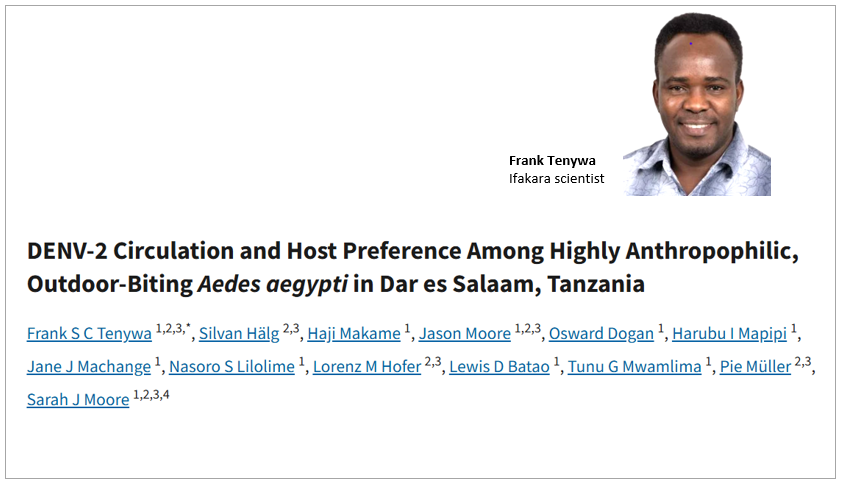
DENGUE: Scientists confirm persistent virus in mosquitoes

Scientists from the Ifakara Health Institute and the Swiss Tropical and Public Health Institute (Swiss TPH) have confirmed that the dengue virus is circulating persistently in mosquitoes in Dar es Salaam, raising serious concerns about the risk of future outbreaks in Tanzania’s largest port and commercial city.
The researchers are calling for stronger surveillance and more targeted mosquito control measures to prevent future outbreaks. Their findings, published on the Viruses journal, highlight the growing threat of dengue transmission in the city, which has experienced repeated outbreaks in recent years.
Ifakara’s Frank Tenywa led the study
The study was led by Ifakara research scientist Frank Tenywa under the supervision of seasoned Ifakara scientist Dr. Sarah Moore who is also affiliated with the Swiss TPH. The team from Ifakara also include Haji Makame, Jason Moore, Osward Dogan, Harubu Mapipi, Jane Machange, Nasoro Lilolime, Lewis Batao, and Tunu Mwamlima. From Swiss TPH, contributors include Silvan Hälg, Lorenz M Hofer, and Pie Müller.
Virus found in multiple districts
The study, detected dengue virus type 2 (DENV-2) in wild Aedes aegypti mosquitoes collected over two years from three major districts - Ilala, Temeke, and Kinondoni. According to the researchers, this indicates ongoing local transmission of the virus, rather than new introductions from outside, pointing to endemic circulation in the city.
Most of the mosquitoes tested had fed on humans—over 80%—which increases the risk of dengue transmission. The study also found that the mosquitoes mostly preferred to bite outdoors, which makes it difficult to control them using current methods that target indoor environments.
Possible persistence since 2014 outbreak
"The virus serotype reported in this study is the same as the one detected in the 2014 outbreak, highlighting the possibility that the virus has been persistent in the ecosystem since then," the researchers noted. However, they caution that only full genome sequencing can confirm whether the current strain is the same or a new version of DENV-2.
Dengue surveillance still lacking in Tanzania
Despite the growing evidence, Tanzania—like many African countries—still lacks clear data on how widespread the dengue virus is. This gap is because most disease monitoring focuses on malaria, while dengue is often overlooked. The researchers recommend improved monitoring, public awareness, and using innovative methods like releasing mosquitoes infected with Wolbachia, a bacteria that stops them from spreading the virus.
"The use of Wolbachia, an endosymbiotic alpha-proteobacterium naturally occurring in arthropods, has shown excellent efficacy in preventing dengue when deployed at a city scale. Wolbachia blocks dengue virus replication, thereby reducing the ability of mosquitoes to transmit the disease," the researchers explained. "This intervention is self-sustaining and may be particularly valuable in rapidly growing urban areas like Dar es Salaam."
Urgent action needed to prevent future outbreaks
Without urgent action, the researchers warn, dengue could become a growing public health threat in Dar es Salaam and other rapidly growing urban areas of Tanzania.
Year-round risk demands year-round action
"Our study confirms the circulation of DENV-2 in the mosquito population in Dar es Salaam, highlighting the risk of a potential dengue outbreak in Tanzania," the researchers said. "The presence of DENV-2 in mosquitoes year-round, as well as the strong human feeding preference of Ae. aegypti indicates the potential risk of DENV transmission to humans."
"These findings emphasize the need for enhanced surveillance and targeted proactive vector control measures, including the removal of breeding sites to mitigate dengue outbreaks," the study concludes.
Read the publication here.
